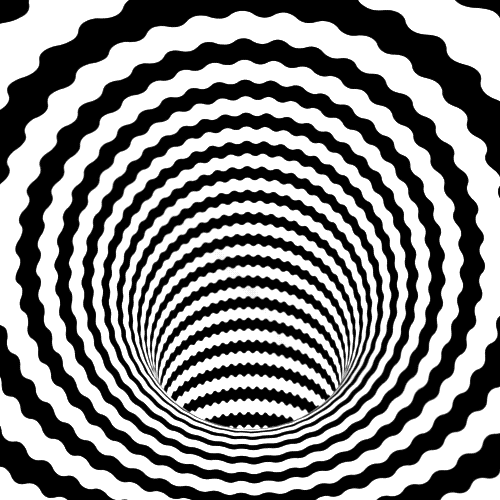Look deeply into the ever turning gyre, and soon enough you can't tell if you're going down or up. And so is the very nature of reality - down, up, fast, slow, these are all relative terms. In fact, this is part of Einstein's theories of relativity, which states (in part) that all motion, all direction, is always relative to the observer. There is no other way to define it. Up is up to you, up could be something different to someone else from a different perspective. Another example - right now, every human on this Earth is flying through space at many thousands of miles per hour. Does it seem that way to you? No, because we are so small relative to the size of the Earth that we don't notice the spinning and the hurtling. It's much bigger than us.
And so with that, here's an interpretive graph of a black hole:
In 3 dimensional space (4 dimensional really, but lets not overly complicate things), the black hole sits at the center of a sphere, and towards its two poles matter and energy falls. Now, what happens at this center - the Singularity which is the black hole - no one has any idea what happens. It's all educated guesses and no one feels confident about any of them. I am confident, however, that the black hole is key to our Universe and understanding it will allow us to understand so very much more. Note - I spend a lot of time thinking about black holes, like an itch I can't stop scratching, because something is big there. Something important. How can all that matter and energy get compressed to... nothing? Something's missing. Finding it will unlock the next game level.
I'm not the only one, of course, spending a lot of time thinking about black holes. Cosmology in large part is now focused on them, since, again just for an example, a massive black hole sits at the center of every galaxy, leading one to wonder - is the black hole necessary for galaxies? Are galaxies in fact nothing but the environments created by black holes? It's possible! Black holes could be very, very tiny too - microscopic black holes might exist all around us, popping into existence and popping back out, the quantum fizz in our effervescent existence. As with all things in this reality, the big is reflected in the small, the small in the big, and scientists are finding that water can be used to simulate many of the effects of black holes. Above, the ocean vortex. Imagine another vortex meeting this one from the bottom of the sea, and you have a black hole effect. Many things can be learned by these simulations, one of which is - look at all the water that avoids the vortex (black hole)! Most of it. Ergo, black holes are no single minded monsters of destruction, but rather they are fundamental to our Universe. Take a look at a cross section:
Only a small percentage of the matter and energy drawn towards a black hole actually goes into the black hole. The rest is spun around, heated up, and thus causes rotation on large scales (i.e. galaxies spinning) and create stars upon stars upon stars - the first star, perhaps, was birthed by a black hole.
So, shed any old notions you might have had about big bad evil black holes. They are, in fact (theory!), the very engines of our Creation, and the greatest mystery that exists today.
Solve the Singularity!





Woah. Acid flashback. Trippy on many levels.
ReplyDeleteIt's like crystals everywhere, man.
ReplyDelete